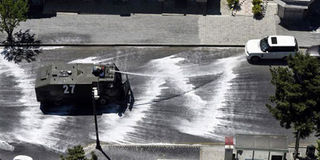Fear, anger as Azerbaijan reinstates virus lockdown

Azerbaijanis will now only be allowed to leave home "once a day for a maximum of two hours after receiving permission via text message" from the authorities. AFP PHOTO
What you need to know:
- The country's chief infection diseases doctor, Ibadulla Agayev, insisted the "epidemiological situation is under control."
Anxiety mingled with anger in Azerbaijan as the Caspian nation reinstated Sunday a tight coronavirus lockdown to contain the surge in infections that followed the easing of restrictions weeks ago.
Azerbaijanis will now only be allowed to leave home "once a day for a maximum of two hours after receiving permission via text message" from the authorities, Prime Minister Ali Asadov said in a statement.
The new measures will remain in force until August 1 in the capital Baku and several other major cities and provinces.
Shopping malls, cafes, restaurants, and hair salons were meanwhile ordered to close as of Sunday, along with cultural and educational institutions.
The move came after the number of infections in the oil-rich ex-Soviet nation doubled in the space of the last two weeks.
Overall, the country of around 10 million people has so far reported 12,238 cases of the coronavirus and 148 deaths.
Azerbaijan imposed a state of emergency to contain the outbreak on March 24. It was then lifted on May 31, with most restrictions relaxed.
'Unpredictable consequences'
The state-run Centre for Social Studies said a recent survey showed that nearly 93 percent of Azerbaijanis are worried about a second wave of the pandemic.
"Coronavirus statistics are worsening on a daily basis. This is frightening, I am afraid of a second wave," 20-year-old student Leyla Guliyeva said.
She said a "repeat quarantine was a necessary measure to prevent the spread of the virus."
But the new restrictions have also angered many who complain the curfew-like lockdown could wreak havoc on the economy and push them into poverty.
"The government again cages us in like zoo animals and gives not a damn to the consequences," said taxi driver Shahin Mamedkuliyev.
"Don't they understand that useless lockdowns only drive people deeper into poverty? If we can't work, we are deprived of our daily bread," he said.
Hairdresser Farida Akhmedova, 38, said: "I have got no words to express how angry I am about the second lockdown. We will be again forced to sit idle at home and the government will not compensate for our financial losses."
Azerbaijan's government paid compensation to those who lost jobs because of the first lockdown.
But this time around, there will be no financial aid to soften the blow.
Analysts said the decision to revoke state relief payments is fraught with "unpredictable social and political consequences" as poverty is expected to increase.
In April, Azerbaijan's GDP declined by 2.6 percent year-on-year, while economic activity in the non-energy sectors collapsed by 13 percent, a World Bank report said this month.
"The government must continue allocating social compensation as the economy is on hold," said economic analyst Gubad Ibadoglu. "Or else, it risks provoking uncontrollable socio-political processes."
"There will be a popular revolution in Azerbaijan," he added.
'Under control'
Health experts have criticised the government's anti-virus response, saying that lifting restrictions prematurely has brought the need for a second lockdown.
"The easing of anti-virus measures three weeks ago was unwarranted, it has been followed by an increase in the caseload and deaths," said Ali Aliyev, professor of Baku's Medical University.
"Paradoxically, we are entering a second lockdown while life gets back to normal in most of other countries."
But authoritarian President Ilham Aliyev's government has defended its handling of the health crisis, insisting that the authorities are in control of the outbreak and that the healthcare system is weathering the pandemic.
"Thanks to the anti-virus restrictions in March and April, we have won time to prepare hospitals for the outbreak," Ramin Bairamly of the governments' anti-virus task-force told journalists last week.
He said the country has procured "large numbers" of mechanical ventilators while 7,000 new hospital beds were available for coronavirus patients.
The country's chief infection diseases doctor, Ibadulla Agayev, insisted the "epidemiological situation is under control."
"If people follow anti-virus recommendations, the pandemic will recede," he said.



